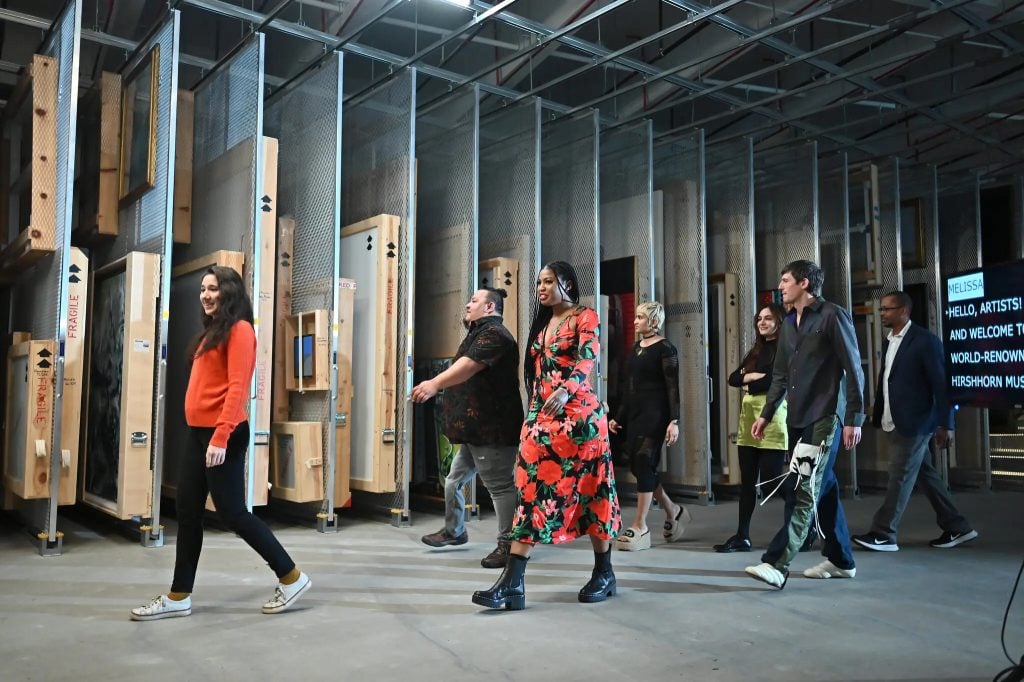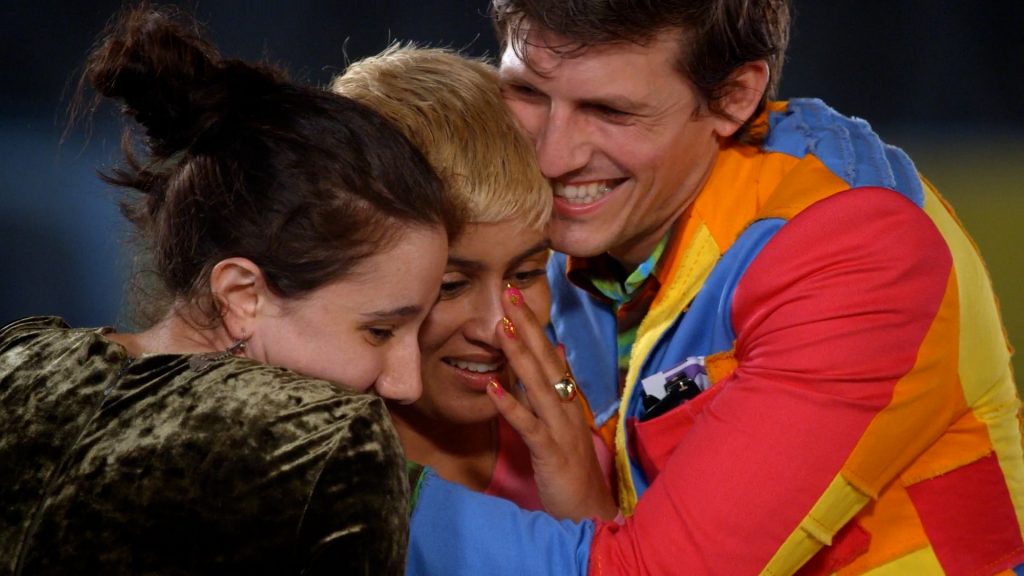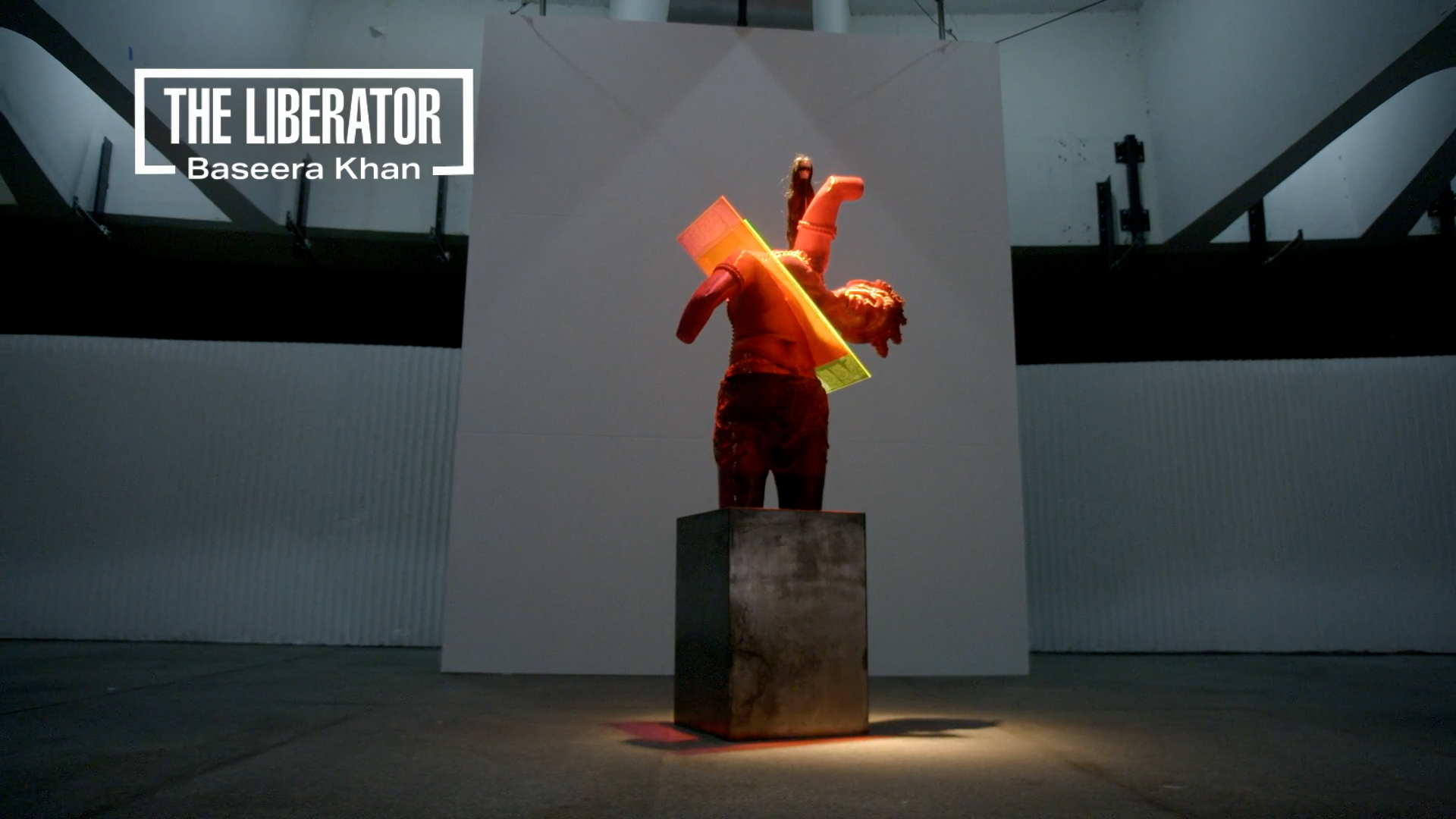As promised, after six episodes and some 45 commissions, The ExhibitsMTV and Hirshhorn’s reality TV competition to crown the next great American artist, is giving its champion their “once-in-a-lifetime” solo showcase at the museum.
Artist Baseera Khan’s winning piece, The Liberators (2022), from their series “Bust of Canons,” will be on view at the Hirshhorn Museum and Sculpture Garden from May 4 through July 16. Its exhibition will be accompanied by a lecture and conversation with the artist on May 25.
The work features a 3D-printed scan of the artist’s body, diagonally sliced through the chakras with plexiglass pans and doused in a luminous pink. It references and subverts a 18th-century statue of a Buddhist deity, called “Naro Dakini,” which is held in the permanent collection of the National Museum of Asian Art in Washington, DC
The sculpture exviews on Khan’s practice of drawing on their bodies and individual experience to discuss universal themes—in this case, the personal and political struggle for liberation.
“Baseera Khan’s The Liberators poignantly depicts a human struggle that could not be more relevant today,” Melissa Chiu, Hirshhorn director and The Exhibits judge, said in a statement. “The perspectives of artists like Baseera Khan show in-person visitors and national television audiences why artists are fundamental to society.”
The Exhibits began airing in March, and pit seven artists against one another for a chance to show their work at the Hirshhorn and win a cash prize of $100,000. Throughout the series, the contestants created works around a weekly theme, which were assessed by Chiu alongside guest judges including JiaJia Fei, Adam Pendleton, Sarah Thornton, and Artnet News’ own Kenny Schachter.

Artists Clare Kambhu, Frank Buffalo Hyde, Jennifer Warren, Baseera Khan, Jillian Mayer, Misha Kahn, and Jamaal Barber enter the Hirshhorn’s collection storage unit to compete in The Exhibit: Finding the Next Great Artist. Photo by Shannon Finney, courtesy of the Smithsonian’s Hirshhorn Museum and Sculpture Garden, Washington, DC
A working artist since the early 2010s, Khan participated in The Exhibits following their first solo shows, “Weight on History,” at the Moody Arts Center in Houston, Texas in 2022, and “I Am an Archive,” at the Brooklyn Museum in 2021. Their work is in the permanent collections of museums including the Whitney Museum and the Guggenheim.
The khan pieces produced on the series ranged from a ringed sculpture of seats that questioned “who gets a seat at the table and who doesn’t”; to a quilt referencing the comfort they found in their own blanket when they contracted coronavirus; to a three-dimensional collage that gleefully deconstructed beauty standards.
The Liberators took Khan about six weeks to complete (unlike their other commissions on the show, audiences did not get to watch them create this one), and according to them, drew from their well of “generative ideas.”
“I had thought through a series of works, one of which I had completed for the Brooklyn Museum show, so I was able to piggyback off some of those ideas and make a brand new work,” they told Artnet News.
Khan’s work went up against those by fellow finalists, Misha Kahn and Claire Kambhu. That it won The Exhibit’s top prize was entirely surprising to the artist, who, when their name was called in the series finale, froze in obvious shock.
“I didn’t even hear them say that I won because I already had in my head that Claire and Misha would win,” they said. “I think Misha tapped me before I woke up and was [I] like, ‘whoa, you said my name.’ I thought, I gotta react, it’s going to be so weird and embarrassing for me not to. So I just put my hands on my face and I just lost it. It was amazing.”

Claire Kambhu, Baseera Khan, and Misha Kahn in the final episode of The Exhibits. Photo courtesy of Paramount.
They won capped an experience that, by their account, was as fulfilling as it was supportive. They recalled, for one, how the contestants pulled together to help Kahn complete his final commission.
“I do think that this MTV show opened up a portal for artists to have more agency,” they said. “It didn’t help me grow as an artist because that’s always been me; I’ve always had that seed. But it helped me grow as a person. To be an artist is to be a person. If you’re not a person, you’re not really a great artist.”
As for the cash prize of $100,000? “Oh, it’s gone,” said Khan. “I put it down on a five-year lease for a studio. I think I spent it in a way that will bring me energy and great protection.”
Khan will next unveil their commission for the High Line in June, a planned archway that continues their bold inquiry into power structures.
“The archway is a colonial architectural feature; it shows power and possession. But it is also the place that people go when they want to fight for democracy,” they said. “And I really love looking at these paradoxes.”
More Trending Stories:
Was Roy Lichtenstein an Appropriation Artist or Plagiarist? A New Documentary Probes the Ethics of His Multimillion-Dollar Comic Art Empire
The Dealer Who Sold the World’s Most Expensive Coin Has Been Arrested for Falsifying the $4.2 Million Artifact’s Provenance
What I Buy and Why: New York Collector Larry Warsh on His Early Eye for Basquiat, and the Octogenarian Artist He’s Coveting Now
87-Year-Old Artist Barbara Kasten on How Her New Career-Defining Monograph Shows She’s More Than Just a Photographer
Hito Steyerl on Why NFTs and AI Image Generators Are Really Just ‘Onboarding Tools’ for Tech Conglomerates
Art Industry News: Rishi Sunak Says There Are ‘No Plans’ to Return the Parthenon Sculptures to Greece + Other Stories
Is This Rolls-Royce the Most Extravagant Car Ever? Designed by Iris van Herpen, It’s Iridescent, Has a Signature Scent… and the Cosmos Inside
Generative Art Sensation Tyler Hobbs Has Filled His Debut London Show With Old-Fashioned Paintings—Painted by a Robot, That Is
The Final Sale of Masterworks From the Collection of Late Microsoft Founder Paul Allen Could Fetch $43 Million at Christie’s
Follow Artnet News on Facebook:
Want to stay ahead of the art world? Subscribe to our newsletter to get the breaking news, eye-opening interviews, and critical takes that drive the conversation forward.

